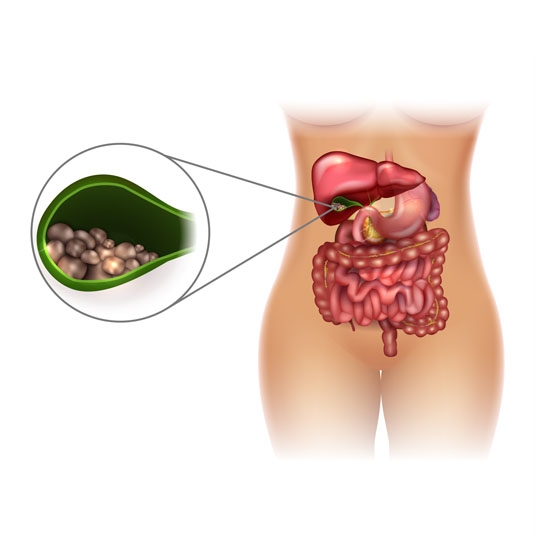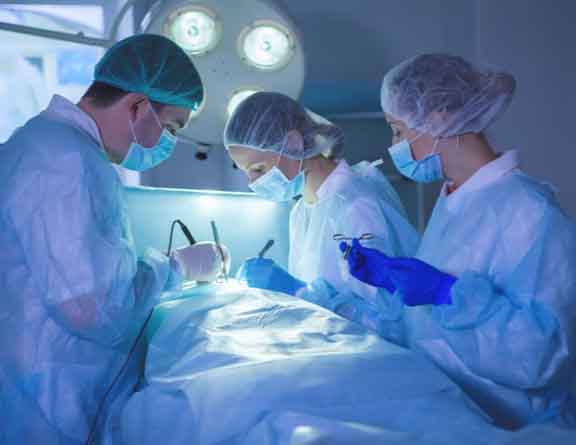Who is more at risk of developing gallbladder stones?
Gallstone is a problem that is related to the body’s ability to break down cholesterol. And there are many things that impact this ability, such as age, gender, weight, hormone imbalance, etc. The people who are more at risk of gallstones are:
- Women are more vulnerable than men
- People of age over 30
- Overweight or obesity
- People who lost weight suddenly or rapidly
- Pregnant women or women on hormone therapy
- Women on birth control pills
- People with a family history of gallstones or diabetes
- People with liver disease
What are the complications if gallbladder stones are left untreated?
Gallbladder stones may not cause any problem for a long time. But if the size of the stones keeps on increasing and they are left untreated, then you may experience the following complications.
- Recurrent and intense abdominal pain and frequent vomiting
- Jaundice if the common bile duct gets blocked
- Acute pancreatitis in which the pancreas start swelling and cause multi-organ failure that can be fatal
- Pus will start to form in the gallbladder
- Gangrene & perforation of the gallbladder
- Cholangitis which is a life-threatening biliary system infection
- May lead to cancer in the gallbladder
Gallstone Surgery Recovery Time in Kanpur
| Gallstone Surgery | Complete Recovery Period | Hospital Stay |
|---|
| ERCP (Endoscopic Retrograde Cholangiopancreatography) | Up to 1 week | Usually outpatient may require a short stay. |
| Gallstone Open Surgery | 6-8 weeks | Varies, typically 2-7 days depending on the procedure. |
| GALLSTONES CBD Calculus | 6 weeks | Varies, typically 2-7 days depending on the procedure. |
How to prepare for gallbladder removal surgery?
The preparation of gallbladder removal surgery doesn’t require extreme measures. Firstly, some pre-operative tests will be performed like blood tests, ECG, X-ray, ultrasound of the gallbladder. The surgeon will prescribe medications if necessary. And most probably, the surgeon will ask you to stop taking aspirin, warfarin, and other blood thinner medicines.
Benefits of laparoscopic gallbladder removal surgery
Surgery is needed to remove gallstones from the gallbladder. It can be done via open surgery or laparoscopic surgery. However, the laparoscopic technique is preferred by people because it offers many benefits like:
- Patients experience less pain after the surgery
- It can be performed within 45 minutes to 1 hour
- Smaller incisions that minimize the risks of infection, excessive bleeding, etc.
- Faster recovery and allow the patient to return to normal activities quickly
- No major scars after surgery
- Minimal chances of recurrence
Apart from all this, when you choose Pristyn Care to undergo laparoscopic gallstone treatment, you get additional benefits like 30% discount on diagnostic tests, single deluxe room, 100% insurance claim, and free follow-ups after surgery.
Dietary Changes for Gallstones
The food items that you eat on a regular basis have a significant impact on the body. If you eat a healthy and balanced diet and combine it with physical activities, it can lower the risk of gallstone development to almost negligible.
According to experts, the ideal diet for gallstones consists of:
- Fiber-rich foods like fresh fruits and vegetables.
- Whole grains, including brown rice, oats, whole wheat bread, etc.
- Fewer refined carbohydrates and less sugar.
- Healthy fats, such as fish oil and olive oil that helps to contract the gallbladder.
Along with knowing what foods to eat, you should also keep your cravings in check and avoid unhealthy fats, such as desserts and fried foods. Talk to your healthcare provider and ask them to make changes in your diet that will help you avoid gallstones and other health problems as well.










.svg)









